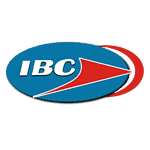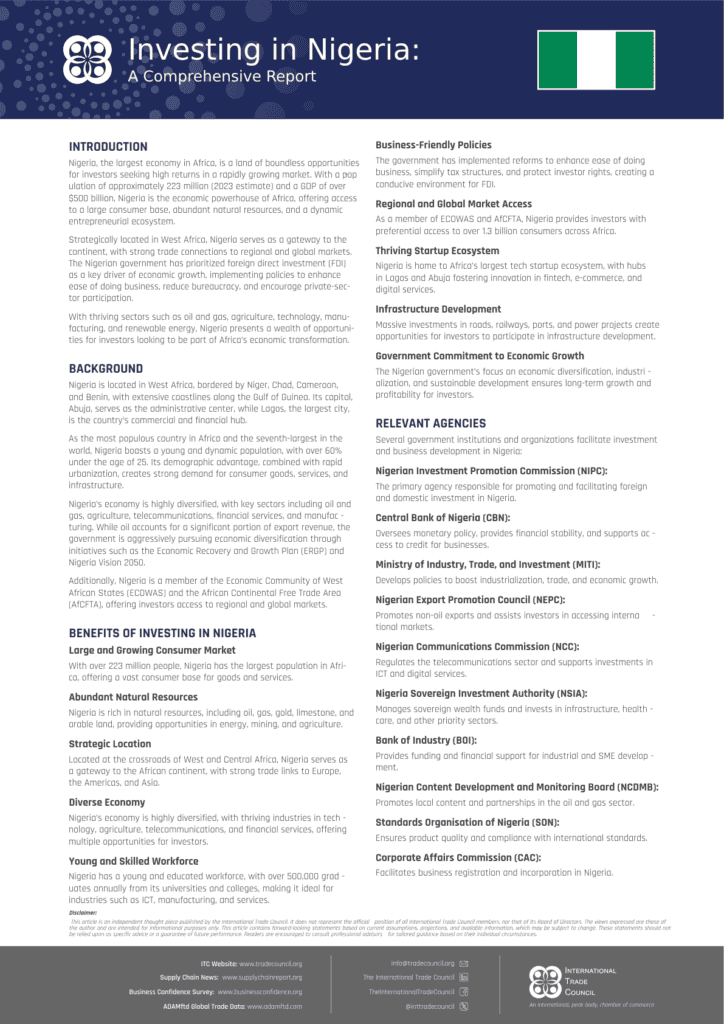- Type of Government: Federal Presidential Republic
- Population: Approximately 223 million
- GDP: Around $477 billion USD
- Corporate Tax Rate: 30%
- Personal Income Tax Rate: Up to 24%
- Major Exports: Crude oil, natural gas, cocoa, rubber
- Major Imports: Machinery, chemicals, transport equipment, manufactured goods
Doing Business with Nigeria
A comprehensive guide to doing business, exporting, investing, and manufacturing in Nigeria.
Exporting to Nigeria involves several steps. Here’s a comprehensive guide:
-
Research Market Requirements
- Understand Nigeria’s import regulations and market demand for your product.
-
Identify Local Partners
- Establish relationships with local distributors or agents to facilitate market entry.
-
Prepare Export Documentation
- Include commercial invoices, packing lists, and certificates of origin. Ensure compliance with Nigerian regulations.
-
Arrange Logistics and Shipping
- Choose a reliable shipping company. Ensure correct completion of shipping documents, such as bills of lading.
-
Customs Declaration
- Work with a customs broker to facilitate the clearance process.
- Submit all required documentation to Nigerian Customs.
-
Understand Duties and Taxes
- Familiarize yourself with any applicable import duties and taxes in Nigeria.
-
Distribution and Sales
- Establish distribution channels within Nigeria.
- Consider partnerships with local businesses for effective market penetration.
Key Contacts
- Nigeria Customs Service
- Website: Nigeria Customs Service
- Nigerian Export Promotion Council
- Website: NEPC
Importing goods into Nigeria involves several steps. Here’s a comprehensive guide:
-
Register as an Importer
- Register your business with the Corporate Affairs Commission (CAC).
- Obtain an Importer’s Code from the Nigeria Customs Service.
-
Obtain a Tax Identification Number (TIN)
- Register with the Federal Inland Revenue Service (FIRS) to get a TIN.
-
Classify Your Goods
- Determine the correct Harmonized System (HS) code for your products to identify applicable duties and taxes.
-
Arrange Shipping and Logistics
- Choose a reliable freight forwarder.
- Ensure all shipping documents are in order, including the bill of lading and commercial invoice.
-
Pre-Arrival Assessment Report (PAAR)
- Apply for PAAR through an authorized dealer bank. This is required for customs clearance.
-
Customs Declaration
- Submit an import declaration to Nigerian Customs through the Nigeria Single Window Trade Portal.
-
Pay Duties and Taxes
- Calculate and pay applicable import duties and taxes through the customs system.
-
Compliance with Standards
- Ensure your goods meet the standards set by the Standards Organisation of Nigeria (SON) or other relevant bodies.
-
Receive Your Goods
- Arrange for the transportation of goods from the port to your warehouse or distribution center.
Key Contacts
- Nigeria Customs Service
- Website: Nigeria Customs Service
- Standards Organisation of Nigeria
- Website: SON
Incorporating a company in Nigeria involves several steps. Here’s a comprehensive guide:
-
Choose a Company Name
- Conduct a name availability search on the Corporate Affairs Commission (CAC) portal to ensure your chosen name is unique.
-
Prepare Required Documents
- Draft the Memorandum and Articles of Association.
- Complete forms CAC1.1, CAC2.1, and CAC2.5.
-
Register with the CAC
- Submit your documents online through the CAC portal.
- Pay the required registration fees.
-
Obtain a Tax Identification Number (TIN)
- Register with the Federal Inland Revenue Service (FIRS) to obtain a TIN.
-
Register for Value Added Tax (VAT)
- If applicable, register for VAT with the FIRS.
-
Register with Pension and Social Insurance Schemes
- If hiring employees, register with the National Pension Commission and the Nigeria Social Insurance Trust Fund.
-
Open a Corporate Bank Account
- Open a bank account in the company’s name for business transactions.
Costs
- Registration Fees: Vary depending on company size and share capital.
- Professional Fees: May include legal or consulting fees.
Key Contacts
Setting up a manufacturing plant in Nigeria involves several steps. Here’s a comprehensive guide:
-
Conduct Market Research
- Analyze demand, competition, and location advantages in Nigeria.
-
Choose a Suitable Location
- Consider infrastructure, proximity to resources, and zoning regulations.
-
Incorporate Your Company
- Register your business with the Corporate Affairs Commission (CAC).
-
Obtain Necessary Permits and Licenses
- Apply for construction permits and environmental clearances from local authorities.
-
Secure Financing
- Explore options through banks or investment partners.
-
Design and Construct the Facility
- Hire architects and contractors for design and construction.
- Ensure compliance with local building codes and safety regulations.
-
Install Equipment and Machinery
- Purchase and set up machinery necessary for production.
- Ensure safety and operational standards are met.
-
Hire and Train Workforce
- Recruit skilled labor and provide necessary training.
-
Set Up Supply Chain and Distribution
- Establish relationships with suppliers and distributors.
-
Begin Operations
- Start production and monitor operations for efficiency and quality control.
Key Contacts
Registering a trademark in Nigeria involves several steps. Here’s a comprehensive guide:
-
Conduct a Trademark Search
- Check the availability of your trademark through the Trademarks, Patents, and Designs Registry to ensure it’s unique.
-
Prepare Your Application
- Gather details including the trademark design, classification of goods/services, and applicant information.
-
Submit the Application
- File your application with the Trademarks, Patents, and Designs Registry. This can often be done online or through an agent.
-
Pay the Application Fee
- Fees vary based on the number of classes and specific services. Check the registry for current rates.
-
Examination Process
- The application is examined for compliance and potential conflicts with existing trademarks.
-
Publication and Opposition
- If approved, the trademark is published in the Trade Marks Journal. There’s a period for third parties to oppose.
-
Registration and Certification
- If no oppositions arise, the trademark is registered, and you receive a Certificate of Registration.
-
Maintain and Renew the Trademark
- Trademarks need periodic renewal to maintain protection.
Related Costs
- Application Fees: Vary depending on the number of classes and specific services. Check with the registry for details.
Key Contacts
- Trademarks, Patents, and Designs Registry
- Website: Trademarks Registry
Resolving commercial disputes in Nigeria involves several steps. Here’s a guide on the process:
-
Attempt Negotiation
- Start by negotiating directly with the other party to reach an amicable solution.
-
Mediation
- Engage a mediator to facilitate discussions. This process is informal and can save time and costs.
-
Arbitration
- Consider arbitration for a private and binding resolution. Both parties must agree to this method.
-
Seek Legal Advice
- Consult with a lawyer specializing in commercial law for guidance on your case.
-
File a Lawsuit
- If other methods fail, file a lawsuit in the appropriate Nigerian court. Prepare necessary documentation and evidence.
-
Court Proceedings
- Attend hearings and present your case. Follow legal procedures as guided by your lawyer.
-
Judgment and Enforcement
- If a judgment is made, ensure its enforcement through legal channels.
Related Costs
- Mediation and Arbitration Fees: Vary depending on the service provider.
- Court Filing Fees: Depend on the jurisdiction and case type; consult local courts.
- Legal Fees: Vary based on the lawyer and complexity of the case.
Key Contacts
When considering doing business in Nigeria, various social, cultural, political, and economic factors must be taken into account.
Social and Cultural Factors
- Language: English is the official language, essential for business communication.
- Business Etiquette: Building personal relationships is crucial. Nigerians value face-to-face meetings.
Political Factors
- Government Structure: Federal Presidential Republic.
- Stability: Political environment can be unpredictable; staying informed about current events is important.
Economic Factors
- Economic Environment: Largest economy in Africa with opportunities in oil, agriculture, and technology sectors.
- Infrastructure: Challenges remain in transportation and energy, but improvements are ongoing.
Foreign Exchange
- Currency: Nigerian Naira (NGN).
- Exchange Rate: Subject to fluctuations; businesses should monitor rates for international transactions.
Rule of Law
- Legal Framework: Complex legal system; contract enforcement can be challenging.
- Judiciary: Efforts are being made to improve transparency and efficiency.
Business Environment
- Workforce: Large and diverse labor force, with varying skill levels.
- Taxation: Understanding local tax obligations is crucial for compliance.
Key Resources
Ask our Experts on Doing Business in/with Nigeria
If you’re looking to do business or invest in Nigeria, we can provide expert guidance, market insights, and valuable connections to help you navigate the local landscape. Contact us today to discover how we can assist in making your venture a success.


















